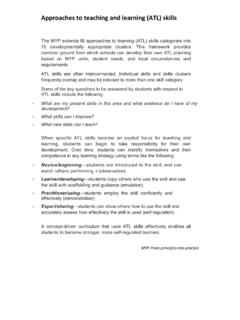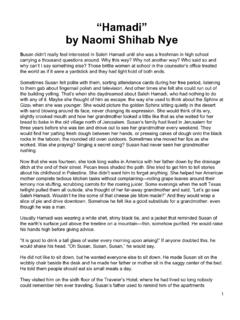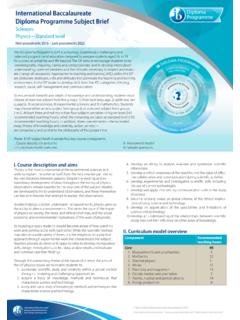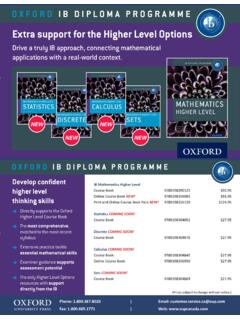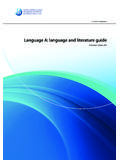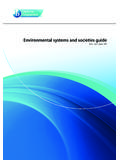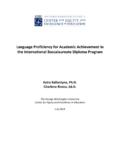Transcription of THE INTERNATIONAL SCHOOL OF ATHENS …
1 THE INTERNATIONAL SCHOOL OF ATHENS Academic Honesty Policy in the IB diploma programme AIMS OF THE POLICY: Promote ethical academic practice and a SCHOOL culture that actively encourages academic honesty Enable students to understand what constitutes academic honesty and dishonesty Ensure that students understand the importance of acknowledging accurately and honestly all ideas and work of others Explain to students that they have an important role in ensuring that their work is academically honest Impart to students that plagiarism is a serious academic offence for which the INTERNATIONAL SCHOOL of ATHENS shows no tolerance Explain to students precisely what consequences will be imposed should they be found
2 Guilty of malpractice Encourage students to look to their teachers, supervisors and IB coordinator for support when completing assessed work in order to prevent any possible form of malpractice The IBO stresses the importance of academic honesty. In the IB publication on academic honesty, it is stated that: all assignments for assessment, regardless of their format, must wholly and authentically use that candidate s own language, expression and ideas. Where the ideas or work of another person are represented within a candidate s work, whether in the form of direct quotation or paraphrase, the source(s) of those ideas or the work must be fully and appropriately acknowledged.
3 This requirement includes a candidate s responses to examination papers in May and/or November. All quotations in a candidate s examination script must be properly acknowledged . (Academic Honesty , IBO) WHAT IS ACADEMIC HONESTY Academic honesty means that one s own work is authentic and not a reproduction of other people s work or ideas. Intellectual property rights must be respected and are often protected by law (copyrights on music, patents, movies, published books). In the arts, you may be inspired by other artists music or creativity. It is perfectly acceptable to be inspired by other artists work but the original source must always be acknowledged.
4 As the IBO Academic Honesty Policy states: The imitation of another artist s work may be acceptable in contexts that are well defined by the teacher, but candidates must understand that passing off the work of another person as their own is not acceptable and constitutes malpractice. PLAGIARISM & MALPRACTICE According to the IBO, a student is guilty of malpractice if he or she plagiarizes, works too closely together with another student (collusion), or duplicates work. Malpractice is also present in other situations.
5 For example, if a student falsifies a CAS-record or brings unauthorized material into an exam. In the IB programme , plagiarism, collusion and duplication are defined as follows: Plagiarism: this is defined as the representation of the ideas or work of another person as the candidate s own Collusion: this is defined as supporting malpractice by another candidate, as in allowing one s work to be copied or submitted for assessment by another student. Duplication of work: this is defined as the presentation of the same work for different assessment components and/or diploma requirements In addition, any other behaviour that gains an unfair advantage for a candidate or that affects the results of another candidate (for example, taking unauthorized material into an examination room, misconduct during an examination, falsifying a CAS record) is defined as academic dishonesty.
6 Cases of plagiarism: Using information from the internet either directly or in a restated form without acknowledging the source. This also includes photos, music, graphs, maps and the like. Copying one sentence or more from a book or the internet without acknowledging the source in quotation marks and in the bibliography. Using 5-8 words in a row from a book/the internet/somewhere else without acknowledging the source constitutes plagiarism. Cases of collusion: Students are expected to work independently for most assessment components. However, in some cases (for example in the group 4-project or the psychology simple experimental study), collaboration is encouraged.
7 Nevertheless, the final product must always be the student s own work. The IBO states that This means that the abstract, introduction, content and conclusion/summary of a piece of work must be written in each candidate s own words and cannot therefore be the same as another candidate s. For example, if two or more candidates have exactly the same introduction to an assignment, the final award committee will interpret this as collusion (or plagiarism). In IB Math, group work is not appropriate for the mathematics HL or mathematics SL portfolio. For mathematical studies SL, group work must not be used for projects.
8 Each project must be based on different data collected or measurements generated. Examples of duplication of work The presentation of the same work for different assessment components constitutes malpractice. For example, if a student hands in a piece of work for a history assignment and then, later, hands in the same, or almost the same, piece of work for his or her Extended Essay, it is malpractice. Other examples of malpractice Fabricating data for a table, a survey or the like constitutes malpractice.
9 Many students know more than one language. It is malpractice to read something in one language and translate it into another and present it as one s own ideas. Furthermore, the IBO views the following as malpractice: 1. Taking unauthorized material into an examination room (such as cell/mobile phone, written notes). 2. Leaving and/or accessing unauthorized material in a bathroom/restroom that may be visited during an examination 3. Misconduct during an examination, including any attempt to disrupt the examination or distract another candidate 4. Exchanging information or in any way supporting the passing on of information to another candidate about the content of an examination 5.
10 Failing to comply with the instructions of the invigilator or other member of the SCHOOL s staff responsible for the conduct of the examination 6. Impersonating another candidate 7. Stealing examination papers 8. Using an unauthorized calculator during an examination, or using a calculator when one is not permitted for the examination paper 9. Disclosing or discussing the content of an examination paper with a person outside the immediate SCHOOL community, including online discussions, within 24 hours after the examination. CONSEQUENCES OF MALPRACTICE: If malpractice is suspected, the nature of the malpractice is reported to the IBO by the external examiner or the IB coordinator.

